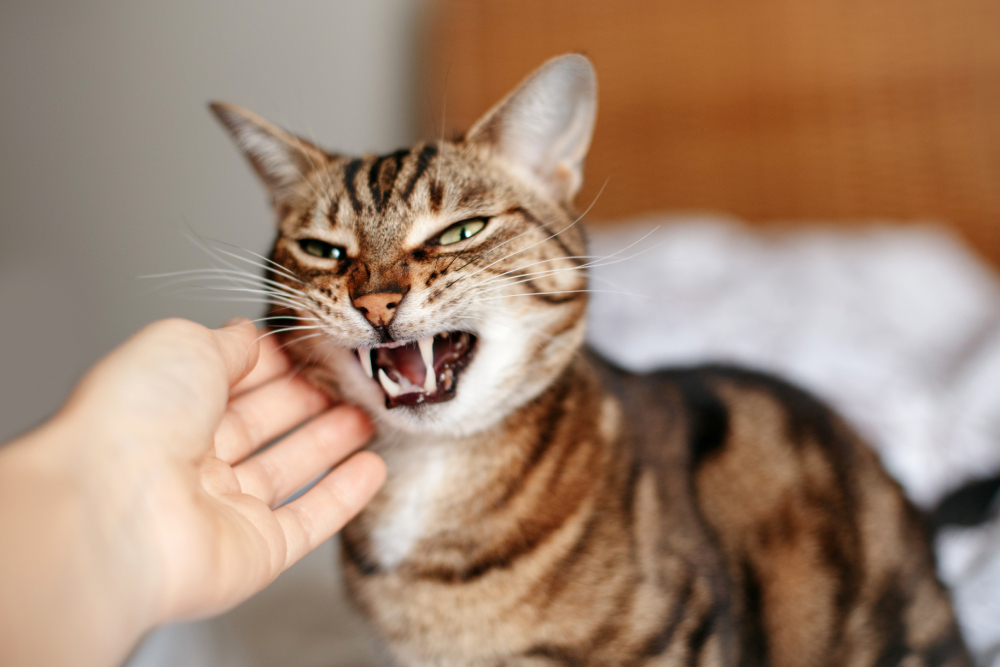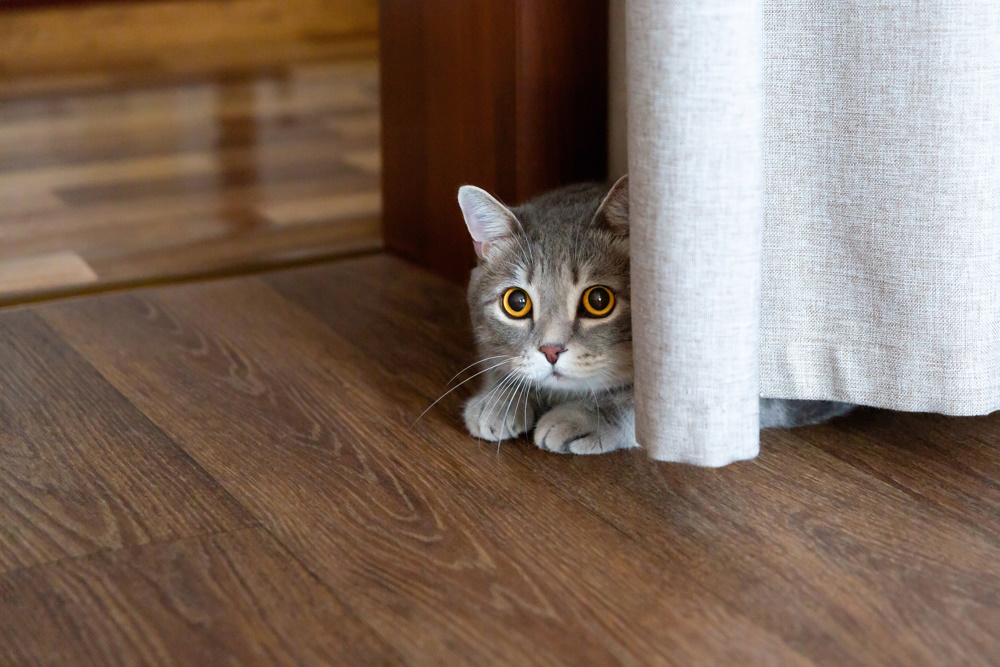You adopted a cat from a shelter and can’t help but wonder about his behavior. He runs out of the room when certain noises are made. He hisses in response to certain objects. Could your cat have PTSD?


Can cats get PTSD?
Cats aren’t often accused of having PTSD, but they can certainly exhibit behaviors that are triggered by sights, sounds, smells, and actions. Stress triggers can range from a storm outside to being left at a family member’s house as a pet sitter while you’re out of town.
Cats who have experienced a traumatic event may display fear-related or aggressive behavior in response to certain stimuli.

What are the signs of PTSD in cats?
Signs of stress and PTSD can be hard to spot in some pets, but are pretty obvious in others, and it can take some time to get used to the behavior of the furry members of our families.
Here are some signs to look out for:
- Avoidance behavior
- Attempts to escape the situation
- Avoid eye contact
- Hiding or climbing into places that are out of reach
- pace
- Crouch as low as possible to avoid being noticed
- Easily surprised
- Being overly focused on what’s going on around you
- Loss of appetite
- Out of breath
- Increased vocalization
- Disruptive behavior
- Aggression, especially in response to specific cues
- Excretion outside the toilet
What causes PTSD in cats?
It can be hard to pinpoint what’s stressing your cat out or causing panicky or aggressive behavior because cats can’t directly communicate what’s bothering them. Also, something could happen to your cat while you’re away, such as being abandoned by a previous owner, which could lead to PTSD in your cat.
Some cats have experienced physical abuse from humans during their lives and are therefore at a much higher risk of developing PTSD.
Physical abuse can include:
- Hitting or shaking the cat.
- Throw him out of a moving car.
- Shoot animals.
Cats can become extremely stressed when they see actions or objects that remind them of the event. Even something as seemingly innocuous as a trip to the vet can be a pain trigger. Loud noises can also set off a stress response in cats. Storms, fireworks, trains, etc. can all be frightening sounds that will make your cat run away.
Abandonment and neglect are more likely to be recognised as events that trigger PTSD, but lack of attention can also contribute to PTSD in cats. These cats are missing out on the vital interaction and socialisation that will help them grow into happy, healthy cats.
You might not think that an illness causes PTSD, but it can play a big factor in how your cat responds to stimuli. If your cat has arthritis pain, they may associate jumping on the couch with pain and start to avoid it. Have your cats had a fight? One or both cats may start to avoid the other. This could also be why your cat starts to avoid using the litter box.



Diagnosing PTSD in Cats
If you notice any unusual behavior in your cat, contact your veterinarian for an examination. Your veterinarian will begin by examining your cat from nose to tail, taking a detailed medical history, and performing a comprehensive physical exam. Your veterinarian will look for any physical changes that may be causing these behaviors, such as back pain.
Your veterinarian may recommend diagnostics to evaluate your cat more thoroughly. Blood tests can look for metabolic changes, and urine tests may reveal a urinary tract infection. Radiographs (X-rays) can help identify bladder stones or sites of arthritis.
Some veterinarians, especially behaviorists, may need to visit your home to observe how your cat reacts to different situations. Video of your cat’s movements, interactions with other pets and family, and hiding places can all provide important information to the veterinary team.


How do I care for a cat with PTSD?
The first step in caring for a cat with PTSD or anxiety is recognizing that there is a problem, and the severity of the anxiety will determine what steps you need to take to help your cat.
1. Changes in the environment
If something in the environment provokes a reaction in your cat, can you get rid of it? Sometimes simply rearranging the furniture or adding a cat tree can make a big difference. A TV or white noise machine can provide a soothing background noise to keep your cat from panicking at loud noises.
If you have more than one cat or other animal, make sure each one has a safe place to eliminate: provide at least one litter box for each cat, plus one more in different areas of the house.

2. Behavioral Modification
Counter conditioning your cat can be difficult, but it’s a great way to help your cat form more positive associations with certain stimuli. What works for one pet may not work for another, so working with an animal behaviorist is often the best way to utilize behavior modification techniques.
3. Medication
Veterinarians use a number of medications to reduce anxiety, which are most effective when combined with behavioral modification.
Commonly used prescription medications include:
- Fluoxetine (Prozac)
- Amitriptyline (Elavil)
- Gabapentin
Supplements such as Purina Calming Care Probiotic can also be helpful. Pheromone products such as Feliway aren’t traditional medicines, but they can help reduce stress and anxiety in cats. Combine pheromones with products such as Cat Attract litter to encourage your cat to use the litter box.
4. Enrichment
Enrichment activities are essential for a cat’s health. They often provide mental and physical interaction and can even build a human-animal bond between you and your cat. Creating puzzle toys and obstacles for your cat to explore are both great ways to enrich your cat’s environment.



FAQ
Do cats become traumatized after a cat fight?
After a cat fight, your cat is likely to be traumatized, especially if the aggressive cat is constantly bullying one of your cats. Affected cats may become more withdrawn, fearful and nervous. They may eat less or start urinating outside their litter box.
Do cats remember traumatic events?
Cats remember the good and bad things that happen to them, and even if it happened once, a harmful event can leave a lasting impression and affect your cat’s behavior for years if you don’t intervene.


Conclusion
Cats can get PTSD, too, although we don’t often call it PTSD or describe it as such. Anxiety-inducing events should be dealt with in a positive way, such as counter-conditioning, if possible. Your vet may also recommend medication as a way to help your cat.
Featured image credits: Rawpixel.com, Shutterstock



